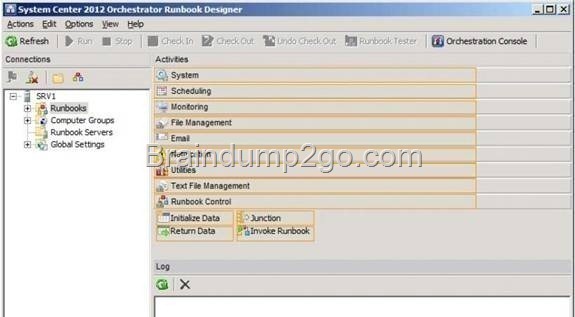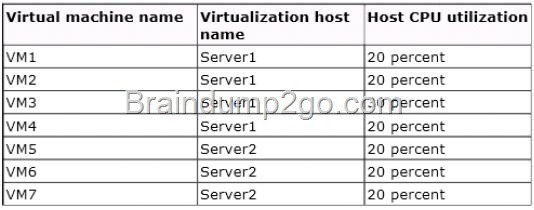QUESTION 21
Hotspot Questions
Your company has a private cloud that contains a System Center 2012 Orchestrator infrastructure. You are creating a runbook named runbook1.
You need to ensure that the workflow starts when a file is added to a folder. From which category should you add an activity? To answer, select the appropriate category in the answer area.

Answer:
![clip_image002[4]_thumb_thumb_thumb_thumb_thumb_thumb_thumb_thumb clip_image002[4]_thumb_thumb_thumb_thumb_thumb_thumb_thumb_thumb](http://examgod.com/l2pimages/2103f20bb12a_885D/clip_image0024_thumb_thumb_thumb_thumb_thumb_thumb_thumb_thumb_thumb.jpg)
Explanation:
Starting Point
A runbook can only have one starting point. A starting point is an activity that automatically runs when the runbook is started. Each activity in the runbook runs after the previous activity in the workflow is complete.
If a runbook starts with any activity other than a monitor, the runbook begins processing and attempts to run to completion. If the runbook starts with a monitor activity, the monitor loads and
waits for the trigger condition. Once the condition is met, a runbook instance is created to run the remaining activities in the runbook. The monitor continues to run and wait another occurrence of the trigger condition. Runbooks that start with monitors continue to run until you stop them from the Runbook Designer or Orchestration console.
http://technet.microsoft.com/en-us/library/hh403783.aspx
QUESTION 22
Hotspot Questions
Your company uses System Center 2012 Service Manager to manage and track problems. You need to ensure that a user named Admin1 is notified automatically when an incident is updated. What should you configure?
To answer, select the appropriate category in the answer area.
![clip_image002[6]_thumb_thumb_thumb_thumb_thumb_thumb_thumb_thumb clip_image002[6]_thumb_thumb_thumb_thumb_thumb_thumb_thumb_thumb](http://examgod.com/l2pimages/2103f20bb12a_885D/clip_image0026_thumb_thumb_thumb_thumb_thumb_thumb_thumb_thumb_thumb.jpg)
Answer:
![clip_image002[8]_thumb_thumb_thumb_thumb_thumb_thumb_thumb_thumb clip_image002[8]_thumb_thumb_thumb_thumb_thumb_thumb_thumb_thumb](http://examgod.com/l2pimages/2103f20bb12a_885D/clip_image0028_thumb_thumb_thumb_thumb_thumb_thumb_thumb_thumb_thumb.jpg)
Explanation:
Service Manager uses notification subscriptions to automatically send notifications to selected recipients when a selected condition occurs.
Source: System Center 2012 Service Manager Console
QUESTION 23
Your company has a datacenter in Los Angeles that contains a private cloud. The private cloud contains a System Center 2012 infrastructure. The System Center 2012 infrastructure contains the following:
– Service Manager
– Orchestrator
– Operations Manager
You plan to configure the private cloud to meet the following requirements:
– Integrate runbooks to Service Manager requests.
– Automate administration tasks by using runbooks.
– Provide end users with the ability to perform administrative tasks.
You need to configure the private cloud to meet the requirements. What should you do from Service Manager?
A. Select the sync folder for the Orchestrator connector.
B. Register the Orchestrator Integration Packs.
C. Create a channel.
D. Register a data source.
Answer: B
Explanation:
The System Center Integration Pack for System Center 2012 Configuration Manager is an add-in for System Center 2012 – Orchestrator. It enables you to automate actions within Microsoft System Center 2012 Configuration Manager, such as software and update deployment. In addition, it allows you create and modify collections.
With this integration pack, you can also create workflows that interact with and transfer information to the integration packs for System Center Service Manager, System Center Data Protection Manager, System Center Operations Manager, and System Center Virtual Machine Manager. Configuring the System Center 2012 ?Service Manager Connections A connection establishes a reusable link between Orchestrator and a Service Manager Server. You can create as many connections as you need to specify links to multiple servers. You can also create multiple connections to the same server to allow for differences in security permissions for different user accounts.
http://technet.microsoft.com/en-us/library/hh830706.aspx
QUESTION 24
Your company has a private cloud that is managed by us.ng a System Center 2012 Operations Manager infrastructure. You plan to create a distributed application named DistributedApp1. You need to ensure that a folder for DistributedApp1 is available from the Monitoring workspace in the Operations Manager console. What should you do?
A. Add the OperationsManagerAppMonitoring object to DistributedApp1.
B. Save DistributedApp1 as a new management pack.
C. Add the OperationsManagerMonitoringView object to DistributedApp1.
D. Save DistributedApp1 in the Default Management Pack.
Answer: B
Explanation:
The Default Management Pack file contains common elements such as views at the top level of the Monitoring workspace. This is an unsealed management pack file so that you can create views and folders at this level. It should not be used for any other purpose. For creating elements such as monitors and rules, create a new management pack file.
Selecting a Management Pack File
http://technet.microsoft.com/en-us/library/hh457560.aspx The Default management pack that ships with OpsMgr 2007 is used to store very specific information for the management group. It is a widely known best practice to NOT write any custom rules, monitors, groups, views, or overrides to this MP. Even customers who know this – and try to enforce this across their organizations…. will still inadvertently get junk in their default MP…. they will save things here by accident, or by granting access to advanced operators who aren’t educated on this topic.
The main problem with doing so…. is that we will build a dependency for this MP on any MP it references….and therefore we wont ever be able to delete those management packs, until we clean this Default MP up, and start enforcing best practices. http://blogs.technet.com/b/kevinholman/archive/2008/11/11/cleaning-up-the-default-mp.aspx
QUESTION 25
Your company has a private cloud that is managed by us.ng a System Center 2012 Operations Manager infrastructure. The Operations Manager management server role is installed on a server named Server1. You deploy a server named Server2, and then join Server2 to the domain. You log on to Server2 and install the Operations Manager agent. You specify Server1 as the management server. You notice that Server1 did not discover Server2. You need to add Server2 as an agent- managed device. What should you do from the Operations Manager console?
A. Run the Discovery Wizard – Computer and Device Management Wizard.
B. Modify the Global Management Server Settings – Security settings.
C. Import the Windows Servers Base Operating System Management Pack.
D. Create a new discovery rule.
Answer: B
Explanation:
System Center Operations Manager 2012: Discovery
http://onetechday.wordpress.com/2012/04/28/system-center-operations-manager-2012-discovery/ By Gol: Windows Servers Base Operating System Management Pack:
http://www.microsoft.com/en-us/download/details.aspx?id=20630
outdated MP for Windows 2000, Windows NT, Windows Server 2003, Windows XP Most likely not the solution, although possible.
Solution should be:We did a manual Agent install
http://technet.microsoft.com/en-us/library/hh212853.aspx
To configure manual agent installation settings for a management group 1.Log on to the Operations console with an account that is a member of the Operations Manager Administrators role.
2.Click Administration.
3.In the Administration workspace, expand Administration, and then click Settings. 4.In the Settings pane, expand Type: Server, right-click Security, and then click Properties. 5.In the Global Management Server Settings – Security dialog box, on the General tab, do one of the following:
To maintain a higher level of security, click Reject new manual agent installations, and then click OK.
To configure for manual agent installation, click Review new manual agent installations in pending management view, and then click OK.
Optionally, select Auto-approve new manually installed agents.
QUESTION 26
Your company has a private cloud that is managed by using a System Center 2012 infrastructure. You plan to monitor a Microsoft .NET application named App1 that is hosted in the private cloud. You need to import the management packs required to monitor the application. Which management packs should you import?
A. the Windows Server 2008 Operating System (Monitoring) management pack and the Operations
Manager APM Web IIS 7 management pack
B. the Windows Server 2008 Operating System (Discovery) management pack and the Windows
Server 2008 Internet Information Services Management Pack
C. the Windows Server Internet Information Services 7 Management Pack and the Operations Manager
APM Web IIS 7 management pack
D. the Windows Server Operating System management pack and the Windows Server 2008 Internet
Information Services Management Pack
Answer: C
Explanation:
Import the IIS 7.0 management pack (Microsoft.Windows.InternetInformationServices.2008.mp) and the Operations Manager APM Web IIS 7 management pack
(Microsoft.SystemCenter.Apm.Web.IIS7.mp).
The Microsoft.SystemCenter.Apm.Web.IIS7.mp management pack is included in the download package in the Management Packs folder–it is not available on the management pack catalog. For information about importing management packs, see Import a Management Pack. Additionally, ensure that IIS 7.0 websites, applications, and services have been discovered. http://technet.microsoft.com/en-us/library/hh543994.aspx
QUESTION 27
Your company has a private cloud that is managed by using a System Center 2012 Operations Manager infrastructure. The network contains several routers and switches. You open the Network Devices view and discover that a switch is in a critical state. You need to identify the availability of the switch during the past seven days. The solution must also ensure that you can review which servers are connected to the switch. What should you use?
A. the Network Vicinity Dashboard
B. the Network Node Dashboard
C. a state view
D. a diagram view
Answer: B
Explanation:
http://www.techrepublic.com/blog/networking/using-the-network-dashboard-views-in-scom- 2012/5226
Network Node Dashboard View
A node is any device connected to a network. Switches and routers are among the most common kinds of nodes you will discover. The node dashboard provides details on the health of a particular device. The upper portion of the node dashboard consists of the network vicinity view for that node, as well as “speedometer” gauges for node availability today, yesterday, in the last week, and in the last month.
(Periods of time that were not monitored are counted as “available” in the availability statistics, so newly discovered devices will not appear to have had outages in the gauges.) The lower portion of the node dashboard includes a list of all interfaces on the node that are being monitored.
From this view, you can manually override the automatic selections of which interfaces are monitored by SCOM. Also, by right-clicking on specific interfaces, you can pivot to performance or reporting views that drill down into the near term or long term history of an interface. In Figure B, the Interface Packet Analysis report for “PORT 4 on “switch1 during the previous week appears in a second window.
![clip_image002[10]_thumb_thumb_thumb_thumb_thumb_thumb_thumb_thumb clip_image002[10]_thumb_thumb_thumb_thumb_thumb_thumb_thumb_thumb](http://examgod.com/l2pimages/2103f20bb12a_885D/clip_image00210_thumb_thumb_thumb_thumb_thumb_thumb_thumb_thumb_thumb.jpg)
QUESTION 28
Drag and Drop Questions
Your company has a private cloud that is managed by using a System Center 2012 infrastructure. The private cloud contains 200 servers that run Windows Server 2008 R2. All of the servers are managed by Operations Manager. The private cloud contains an application named App1 that is deployed on-demand to several servers. The servers that run the application are identified by a registry value set during the application’s installation. You create a monitor that targets all of the servers. You need to modify the monitor to only affect the servers that have the application installed.
![clip_image002[12]_thumb_thumb_thumb_thumb_thumb_thumb_thumb_thumb clip_image002[12]_thumb_thumb_thumb_thumb_thumb_thumb_thumb_thumb](http://examgod.com/l2pimages/2103f20bb12a_885D/clip_image00212_thumb_thumb_thumb_thumb_thumb_thumb_thumb_thumb_thumb.jpg)
Answer:
![clip_image002[14]_thumb_thumb_thumb_thumb_thumb_thumb_thumb_thumb clip_image002[14]_thumb_thumb_thumb_thumb_thumb_thumb_thumb_thumb](http://examgod.com/l2pimages/2103f20bb12a_885D/clip_image00214_thumb_thumb_thumb_thumb_thumb_thumb_thumb_thumb_thumb.jpg)
QUESTION 29
Your company has a private cloud that is managed by using a System Center 2012 infrastructure. The network contains an Operations Manager infrastructure and a Virtual Machine Manager (VMM) infrastructure. The private cloud contains a clustered VMM solution that has two virtualization hosts. The VMM solution hosts seven virtual machines. The virtual machines are configured as shown in the following table.

You configure Dynamic Optimization to use the following settings:
– A CPU Dynamic Optimization threshold of 30 percent
– A CPU host reserve threshold of 15 percent
– Low aggressiveness
You monitor the VMM solution and discover that the virtual machines rarely migrate from Server1 to Server2 when CPU utilization exceeds the configured threshold. You need to increase the likelihood of the virtual machines migrating from Server1 to Server2 when CPU utilization exceeds the configured threshold. What should you do?
A. set the Aggressiveness to High.
B. Enable Power Optimization.
C. Configure a host profile.
D. Modify the CPU host reserve threshold.
Answer: A
Explanation:
http://blogs.technet.com/b/scvmm/archive/2011/05/04/dynamic-optimization-and- poweroptimization-in-scvmm-2012.aspx
Good post here:
What have you configured regarding the dynamic optimization? How aggressive is the treshold for optimizing your cluster? First of all, you must check the option “Automatically migrate virtual machines to balance load”. Second, specify how aggressive the optimization should be. The more agressive, the more likely to live migrate VMs even for small gain.
Last, you can also configure the resource treshold for when optimization should kick in.
Default it`s set to 30% CPU and 512 MB RAM.
To test and verify, right click on your cluster, and click “optimize hosts”. VMM will check if it`s anything to gain, on demand, and eventually live migrate VMs to balance the load.
http://social.technet.microsoft.com/Forums/en-US/virtualmachingmgrhyperv/thread/45dfd50da2a4-4a7a-9c88-53fd7cedda77
QUESTION 30
Your company has a private cloud that is managed by using a System Center 2012 Operations Manager infrastructure. The network contains two network segments that are separated by a firewall. You have a management server named OM1. You create a discovery rule and configure the rule to discover SNMP devices. You discover that only the devices on the network segment that contains OM1 are discovered. You need to ensure that the devices supporting SNMP on both network segments are discovered. Which firewall port should you allow on the firewall?
A. TCP 125
B. TCP 22
C. UDP 162
D. UDP 161
Answer: D
Explanation:
SNMP uses the default UDP port 161 for general SNMP messages and UDP port 162 for SNMP trap messages.
http://technet.microsoft.com/en-us/library/cc959643.aspx
Download Free Braindump2go New Updated Microsoft 70-246 Dumps Full Version, In PDF Format, 176 Questions and Answers in all: http://www.braindump2go.com/70-246.html

